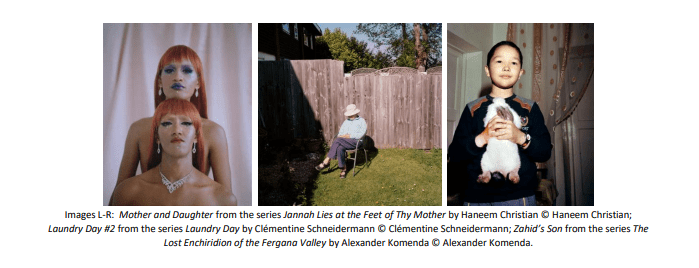4 August 2022
National Portrait Gallery announces shortlist for Taylor Wessing Photographic Portrait Prize 2022
2022 exhibition will open at Cromwell Place arts hub, South Kensington on 27 October

Three international photographers have been shortlisted for the Taylor Wessing Photographic Portrait Prize 2022, the prestigious photography award organised by the National Portrait Gallery, London. The shortlisted works will be displayed in the Taylor Wessing Photographic Portrait Prize 2022 exhibition at Cromwell Place, a new arts hub in South Kensington, London from the 27 October until 18 December 2022, while the Gallery’s building in St Martin’s Place is closed for major redevelopment works.
Selected by a panel of judges from 4,462 entries from 1,697 photographers, the three shortlisted photographers are:
- Haneem Christian for Mother and Daughter and Rooted, which explore queerness, transness and the importance of chosen family.
- Clémentine Schneidermann for portraits from the series Laundry Day, which document the daily chores of her neighbour in South Wales, navigating life in lockdown.
- Alexander Komenda for Zahid’s Son, a portrait that examines themes of identity and the post-Soviet landscape in Kyrgyzstan.
The annual Taylor Wessing Photographic Portrait Prize, now celebrating fifteen years under Taylor Wessing‘s sponsorship, is one of the most prestigious photography awards in the world and showcases new work submitted by some of the most exciting contemporary photographers. The winner of the first prize will receive £15,000. The second prize-winner receives £3,000 and the third prize £2,000.
Following an anonymous judging process, the winner will be announced on Tuesday 25 October 2022. This year’s judging panel was chaired by National Portrait Gallery Director, Dr Nicholas Cullinan, who was joined by Chief Foreign Correspondent at The Sunday Times, Christina Lamb; award-winning photographer, Siân Davey; the Director of Photoworks, Shoair Mavlian; and the Taylor Wessing Photographic Portrait Prize 2022 curator, Eva Eicker.
The following photographs have been shortlisted for the Taylor Wessing Photographic Portrait Prize 2022.
Haneem Christian for Mother and Daughter and Rooted
within the Black and Brown LGBTQIA+ community.
Clémentine Schneidermann for Laundry Day #2 and Laundry Day #3
Clémentine Schneidermann is a French photographer, living and working between Paris and South Wales. With a focus on social documentary photography, her approach is collaborative and playful, with a particular interest in communities. She is a co-founder of Ffasiwn Stiwdio, a photography-based creative studio that creates programmes with youth groups, and in 2021, she completed a practice-based PhD at the University of South Wales, Cardiff.
Schneidermann’s portraits from her series Laundry Day depict the artist’s neighbour, hanging laundry in the garden of her home in South Wales. Taken during another challenging year in the UK, the photographs “document micro events which deal with the passage of time through the small moments of our daily lives,” comments Schneidermann.
Through the obsessive photography of one daily chore, the photographer captures the everyday. The socially distanced portraits, which are close, but not close enough to see the sitter’s face, are part of a series of works taken during times of quarantine, self-isolation, and national lockdowns.
Alexander Komenda for Zahid’s Son
Alexander Komenda is a Polish-Canadian documentary photographer and artist, whose work focuses on revealing the nuances of everyday life. His interests in identity and collective memory are utilised in his practice in order to explore the boundaries between unity and division in relation to his subjects. In 2020, Komenda completed his BA in Documentary Photography at the University of South Wales, Cardiff and is currently undertaking an MA in Photography at Aalto University in Espoo, Finland.
Zahid’s Son forms part of Komenda’s ongoing series, The Lost Enchiridion of the Fergana Valley, and examines identity and the post-imperialist landscape of the Fergana Valley, which spreads across Uzbekistan, Kyrgyzstan and Tajikistan.
Photographed on the Kyrgyz side of the Fergana Valley, Komenda’s portrait depicts the son of Zahid, an Uzbek friend working in the field of human rights in Osh, Kyrgyzstan. The nameless sitter is photographed in his domestic setting, holding a pet rabbit.
Those who reside in the Fergana Valley are still living with the legacy of its Soviet past, and in southern Kyrgyzstan, Uzbek people continue to face significant marginalisation. This portrait dignifies the presence of Zahid and his family. The artists recalls a conversation with Zahid, in which he said, “as Uzbeks, my children could never become president or be in positions of government”.
Dr Nicholas Cullinan, Director National Portrait Gallery, said: “Congratulations to the shortlisted photographers; once again, this year’s entries demonstrate the outstanding level at which photographers across the world are working. Since the launch of the Prize in 1993, now in its fifteenth year of sponsorship by Taylor Wessing, over one million people have seen the exhibition, which continues to bring the very best in contemporary photography to our audiences. I look forward to welcoming both new and returning visitors this autumn at Cromwell Place.”
Shane Gleghorn, Managing Partner at Taylor Wessing, said: “The shortlist of talented artists for this year's Taylor Wessing Photographic Portrait Prize is exceptional. We are proud to continue supporting the Prize, not least because the prestige it has established internationally draws an increasing number of artists to participate and provides them with a showcase for photographic portraiture. We look forward to the official unveiling of the exhibition at Cromwell Place and the winner's announcement for 2022.”
Eva Eicker, curator of Taylor Wessing Photographic Portrait Prize 2022, said: “The annual Taylor Wessing Photographic Portrait Prize and the portraits exhibited as part the exhibition allow a collective representation of, yet another a difficult year. Seeing such a variety of themes and approaches provided an honest glimpse into people’s lives, and I am excited to curate the compelling selection of photographs in the exhibition this year.”
Related Insights
Katie Chandler recognised in The Lawyer's Hot 100 2024
by Shane Gleghorn and Katie Chandler
